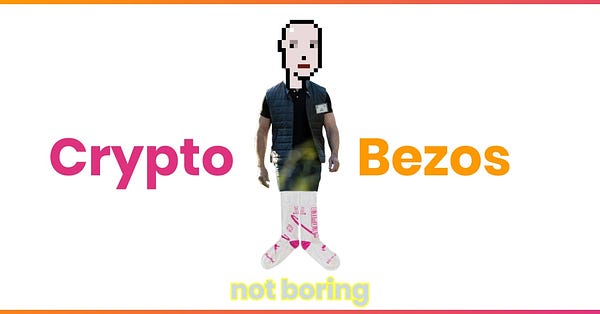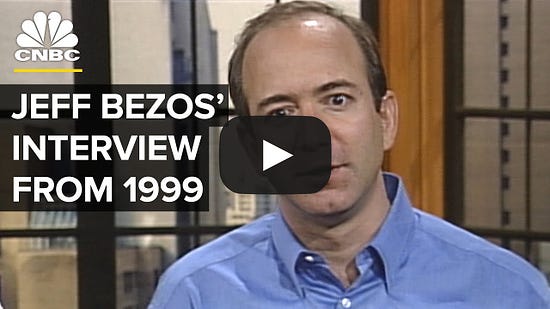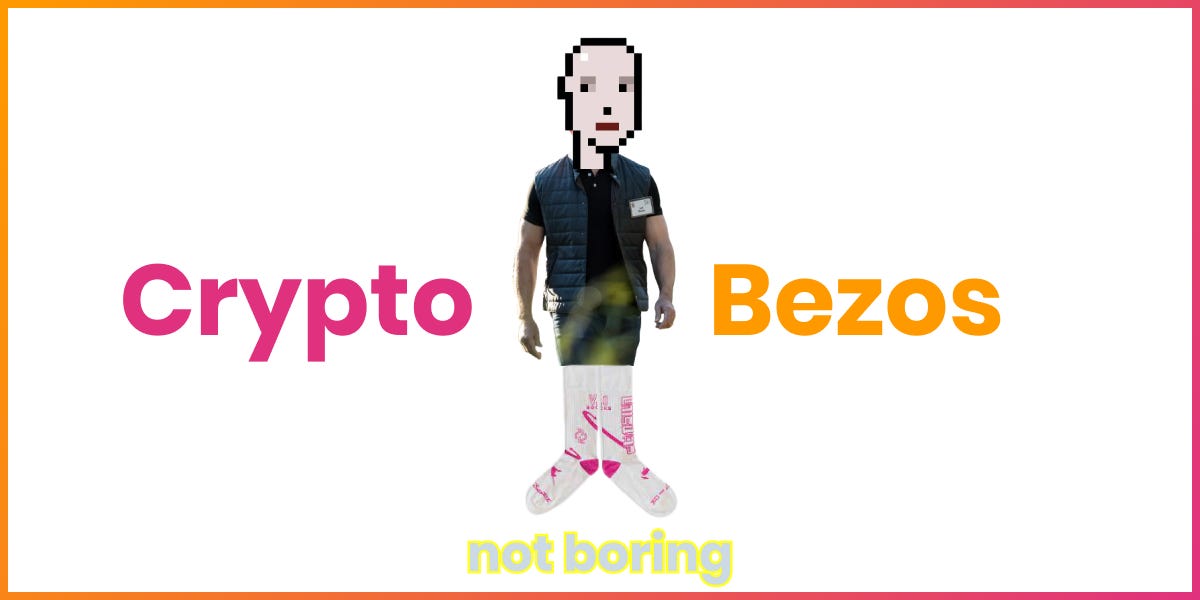Not Boring by Packy McCormick - Crypto Bezos
Welcome to the 839 newly Not Boring people who have joined us over the last two weeks! Join 76,626 smart, curious folks by subscribing here: 🎧 To get this essay straight in your ears: listen on Spotify or Apple Podcasts Today’s Not Boring is brought to you by… Secureframe Security compliance isn’t the biggest priority when it comes to running a startup...until it is. When it comes to enterprise deals, every large company requires SOC 2 or ISO 27001. The problem is, getting SOC 2 and ISO 27001 compliant can take months of time and engineering resources to get all the evidence you need. It’s a pain, and puts startups at a disadvantage. Secureframe allows companies to get SOC 2 and ISO 27001 compliant within weeks, rather than months. Its software monitors 40+ services, including AWS, GCP, and Azure, and continuously collects audit evidence, runs security awareness training, manages vendors, monitors infrastructure, and more, all automatically. Plus, the Secureframe compliance team can answer any questions you have. Secureframe customers save an average of 50% on their audit costs and hundreds of hours of their time. You’ll need to do this eventually, get ahead by scheduling a free demo now! Hi friends 👋, Happy Monday! I haven’t written about a specific company or protocol for the past few weeks, since I wrote about Solana on August 23rd. I’ll get back to analyzing specific companies, protocols, and projects soon, but for now, it feels like we’re in the middle of one of those big, once-in-a-generation shifts, and I’m trying to make sense of it all in real-time. It’s a two-step dance: understand what’s happening as best I can, and then figure out how to translate it such that it makes the most sense to the most people. One way to do that is to simply analyze and explain what’s going on in the present. I’ve tried to do that with Status Monkeys, Nifty Corporates, Story Time, Infinity Revenues, Infinity Possibilities, The Great Online Game, Own the Internet, The DAO of DAOs, and The Value Chain of the Open Metaverse. Another is to guess at where it’s all heading, like I did in Power to the Person, The Cooperation Economy, The Interface Phase, and Compounding Crazy. The third way is just to look back. While history isn’t a perfect guide to the future, it’s it’s helpful to remind ourselves that what once seemed laughably futuristic is now normal. Let’s get to it. Crypto BezosC’mon, Packy. You’re better than this. Writing a blog post about what web3 founders and investors can learn from Jeff Bezos? Jeff Bezos!? Google “Jeff Bezos Business Lessons” and you’ll get 2.8 million results. This has been done before! I know I know, but last week, I got sucked into the old Jeff Bezos interview rabbit hole on YouTube. Two things struck me:
Those two observations bounced around in my brain and blobbed into a question: What kind of company would Jeff Bezos start if he were 30 years old today? Bezos founded Amazon.com when he was 30 years old, back in 1994. Today, it’s the fifth most valuable company in the world, with a $1.75 trillion market cap. Bezos himself is the richest person in the world and the only one out of the 7.9 billion of us with a net worth over $200 billion. He recently flew to space on his own company’s spaceship. He’s done well, and everyone knows it. The incredible part of the Amazon story to me, though, is how and why it started. Other companies have built better business models than Amazon. Google and Facebook are money-printing machines, which Ben Thompson calls Super Aggregators:
Amazon has to buy and hold physical inventory, build warehouses, create a global logistics network… in other words, they deal with atoms. Google and Facebook just deal in bits. But for this exercise, intent matters. Larry Page, Sergey Brin, and Mark Zuckerberg didn’t set out to build internet behemoths. Google started as a research project, BackRub, that Page and Brin began as Stanford PhD students. Zuck launched Facebook from his Harvard dorm to rate girls. Bezos, on the other hand, set out with the intention to build a giant business by leveraging the internet’s unique capabilities, and was careful to highlight that Amazon was not an internet business. It was a customer business. Amazon could only exist because of the internet, but being on the internet wasn’t the value proposition. Bezos knew that the internet was a tool he could use to give customers the things that actually mattered to them: better selection, lower prices, convenience, and a superior customer experience. If 30-year-old Jeff Bezos were leaving the hedge fund world to start a business today, chances are, he’d be launching something in web3. It’s growing insanely fast and has the potential to shake everything up enough to create massive, category-defining companies. I’ve been fully crypto-pilled, and I recognize that my brain is in “have hammer, look for nails” mode, but when I watched the four Bezos interviews, both what Bezos said and the way that his interviewers viewed him and Amazon, I couldn’t help but draw comparisons with everything going on in web3 today. This is why I can still look myself in the mirror after writing a “Lessons from Jeff Bezos” post: there’s a lot of Bezos lore that applies to companies at any point in time, but the stuff we’re covering today only applies in the “critical category creation time.” With web3, we’re living through one of those rare times when whole segments will be reshaped and new ones will be created from whole cloth. Plus, as much fun as the speculative side of crypto is, what really excites me is the new types of businesses and projects that crypto makes possible when you look beyond the hype. I don’t think Bezos would just start a web3 company to start a web3 company. Crypto would be a means, not an end. He’d start something that took advantage of web3’s unique capabilities to better serve customers. He’d likely care a lot more about certain aspects of web3 than most people, and a lot less about other aspects than most people. He would be unafraid to incorporate non-crypto tech, and even atoms, where useful. The question is, then, what kind of company would he start to take advantage of web3’s unique characteristics to better serve customers and “build a lasting important company born of” web3? The question assumes two things: 1) no one has built a Bezos-esque web3 company to date, and 2) it’s possible to build such a company. The former may be a bad assumption because such a vision may be hiding inside of an unassuming wedge, and the latter may be untrue if web3 is indeed a “stack with ‘fat’ protocols and ‘thin’ applications.” Either way, it’s a fun and useful thought exercise and an illuminating trip down memory lane, so we’ll try to answer the question by watching four early Bezos interviews and exploring:
I’m not as smart as Jeff Bezos, though, so I don’t have the answer. I’ll set the stage and give some guesses, but I’d love to hear what you think as well. Get involved by replying to this tweet:   First, let’s set the stage. Is web3 the kind of tectonic shift that would attract a young Jeff Bezos? Critical Category Formation TimeThe mainstream reaction to Web3 in 2021 feels an awful lot like the reaction to Amazon felt in 1999. That’s hard to really grok until you teleport yourself back to that time. In hindsight, a company like Amazon seems inevitable. Amazon is Amazon. But even five years into its life, when it was worth $30 billion, the media dismissed it as almost a joke, an overhyped and overvalued futuristic oddity thingamajigger. Its dominance was not a foregone conclusion, or even likely, to anyone outside of Seattle. The way the press talked about Amazon then is the way it talks about crypto now. Watch this 1999 interview Bezos did with 60 Minutes:  Knowing what we know about Amazon now, the interview is cringeworthy. Take, for example, the part in which Bob Simon opines on why Bezos had an unsuccessful dating life in college via voiceover:
One could imagine 60 Minutes 17.1 million viewers laughing along with Simon at that rich nerd. This segment, Nerd of the Amazon, was filmed at an in-between time, when Amazon was already a large, public company, but long before its numbers had caught up to its valuation. As Simon said, “It lost $125 million last year. The company says it’s investing for the future. Skeptics say, it would have to sell every book being sold in the world today to justify its stock price.” It’s a well-preserved snapshot of the kind of period that Bezos called a “critical category formation time.” In 1999, the internet was up for grabs, and “electronic commerce,” which we just call ecommerce when we call it anything different at all, was a nascent and underdeveloped category. Skeptics rightly pointed out that Amazon’s valuation was crazy based on the reality at the time, but they missed the fact that Amazon would both expand the market and that Amazon itself would do more than just sell books. Twenty-two years later, Amazon still doesn’t sell every book in the world, but it sells a whole lot more than books, including Amazon Web Services, the main driver of its profits and growth. The company is now worth 60x what it was when the piece was shot in 1999. Watching that video, the similarities between the general public’s views towards Amazon then and towards crypto today struck me over the head. A good video editor could keep the same quotes, replace a few words, and put out a believable 60 Minutes piece on crypto today. A few quotes that were particularly reminiscent of the current dialogue:
See what I mean? Now, I admit that there’s survivorship bias here. I could probably go back and find 60 Minutes features on companies that seemed crazy and ended up failing. Amazon’s ultimate success doesn’t necessarily mean that crypto will succeed. But the similarity in the tone towards Amazon then and the tone towards crypto today is eerie: this is big, and we don’t understand why it’s so big, so let’s cover it, laugh it off, and move on. I believe we’re in a “critical category formation time” today, too. Just as Amazon hired away execs from Walmart, Borders, and other major retailers, new people are jumping into web3 daily today. Elena Burger’s excellent Is This Public? is literally about a smart young person leaving a hedge fund to get into crypto, like Bezos left a hedge fund to get into the internet in 1994. I just backed Optilistic, which is training senior web developers to become blockchain engineers and is flooded with applications. Station is “onboarding and empowering the next billion contributors.” Crypto projects and protocols are attracting hundreds of millions of investment dollars at multi-billion dollar valuations, and in most cases, they’re trading more on promise than numbers. It’s easy to compare Ethereum’s market cap to Bank of America’s or JP Morgan’s in chuckling disbelief. Amazon even partnered with Sotheby’s in June 1999 to make people more comfortable with an entirely new behavior -- buying things online. 
Sound familiar? The tide is shifting once again, and the similarities are uncanny. I think that young Jeff Bezos would build a crypto company today. How would he approach it? Early Amazon IngredientsBefore anyone knew who he was, a young, balding man sat down for an interview on Web and Internet Pioneers with Richard Wiggins.
The video is one of the best things on the internet, a must-watch for anyone interested in technology, entrepreneurship, or strategy. If you get nothing else out of this piece, just watch the video: To watch the video, learn how Bezos used books as a wedge, what web3 does well, and what Bezos might build today…Thanks to Dan and Puja for editing! Heroes. Stytch x Not Boring: The 0 to 1 JourneyThis Thursday, September 23rd, I’m hosting a session with Thrive’s Gaurav Ahuja and Stytch on the founders’ journey going from 0 to 1. Stytch is an API-first company backed by Benchmark, Index, and Thrive. Its founders, Reed McGinley-Stempel and Julianna Lamb, will share tips on hiring early engineers, building a product strategy, landing your first customers, and fundraising. The event is free - join us! New NFT Obsession: WanderersYesterday, I discovered Wanderers, a space-themed NFT collection that resonated with me more than any I’ve seen. The current NFTs are animated, colorful, and play spacey music on loop. I bought three, my biggest NFT purchase to date. Holders have access to future drops — planets and avatars — and there’s a whole story developing around the Wanderers. The Discord (you don’t need to own to join) is one of the more fun and welcoming I’ve found. If you’ve been wanting to dip your toes into NFTs, this seems like a fun place to start. Check out the collection on OpenSea. * This is not an ad and it’s NOT FINANCIAL ADVICE. How did you like this week’s Not Boring? Your feedback helps me make this great. Loved | Great | Good | Meh | Bad Thanks for reading, and see you on Thursday, Packy If you liked this post from Not Boring by Packy McCormick, why not share it? |
Older messages
The Interface Phase
Monday, September 13, 2021
First we shape our interfaces; thereafter, they shape us.
Nifty Corporates
Monday, August 30, 2021
VISA, Budweiser, Marvel, and the Positive Sum Corporate NFT Awakening
Solana Summer
Monday, August 23, 2021
The $21B Blockchain and the Arrow of Time
Story Time
Monday, August 16, 2021
The Progressive Decentralization of Narrative
Lithic's New Customer
Friday, August 13, 2021
Meet the $800M 💳 🚀 Making Issuing Cards as Easy as Accepting Payments
You Might Also Like
🔮 $320B investments by Meta, Amazon, & Google!
Friday, February 14, 2025
🧠 AI is exploding already!
✍🏼 Why founders are using Playbookz
Friday, February 14, 2025
Busy founders are using Playbookz build ultra profitable personal brands
Is AI going to help or hurt your SEO?
Friday, February 14, 2025
Everyone is talking about how AI is changing SEO, but what you should be asking is how you can change your SEO game with AI. Join me and my team on Tuesday, February 18, for a live webinar where we
Our marketing playbook revealed
Friday, February 14, 2025
Today's Guide to the Marketing Jungle from Social Media Examiner... Presented by social-media-marketing-world-logo It's National Cribbage Day, Reader... Don't get skunked! In today's
Connect one-on-one with programmatic marketing leaders
Friday, February 14, 2025
Enhanced networking at Digiday events
Outsmart Your SaaS Competitors with These SEO Strategies 🚀
Friday, February 14, 2025
SEO Tip #76
Temu and Shein's Dominance Is Over [Roundup]
Friday, February 14, 2025
Hey Reader, Is the removal of the de minimis threshold a win for e-commerce sellers? With Chinese marketplaces like Shein and Temu taking advantage of this threshold, does the removal mean consumers
"Agencies are dying."
Friday, February 14, 2025
What this means for your agency and how to navigate the shift ͏ ͏ ͏ ͏ ͏ ͏ ͏ ͏ ͏ ͏ ͏ ͏ ͏ ͏ ͏ ͏ ͏ ͏ ͏ ͏ ͏ ͏ ͏ ͏ ͏ ͏ ͏ ͏ ͏ ͏ ͏ ͏ ͏ ͏ ͏ ͏ ͏ ͏ ͏ ͏ ͏ ͏ ͏ ͏ ͏ ͏
Is GEO replacing SEO?
Friday, February 14, 2025
Generative Engine Optimization (GEO) is here, and Search Engine Optimization (SEO) is under threat. But what is GEO? What does it involve? And what is in store for businesses that rely on SEO to drive
🌁#87: Why DeepResearch Should Be Your New Hire
Friday, February 14, 2025
– this new agent from OpenAI is mind blowing and – I can't believe I say that – worth $200/month





